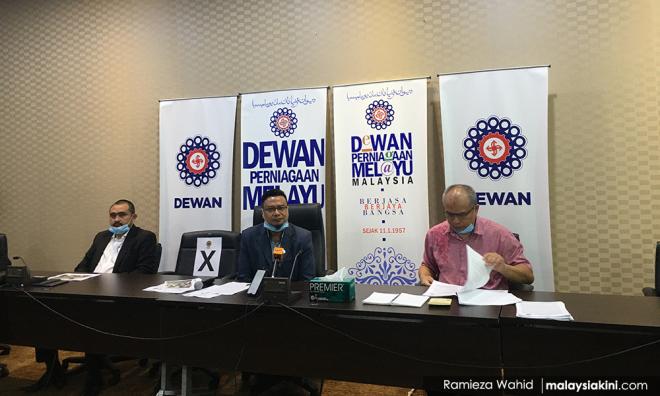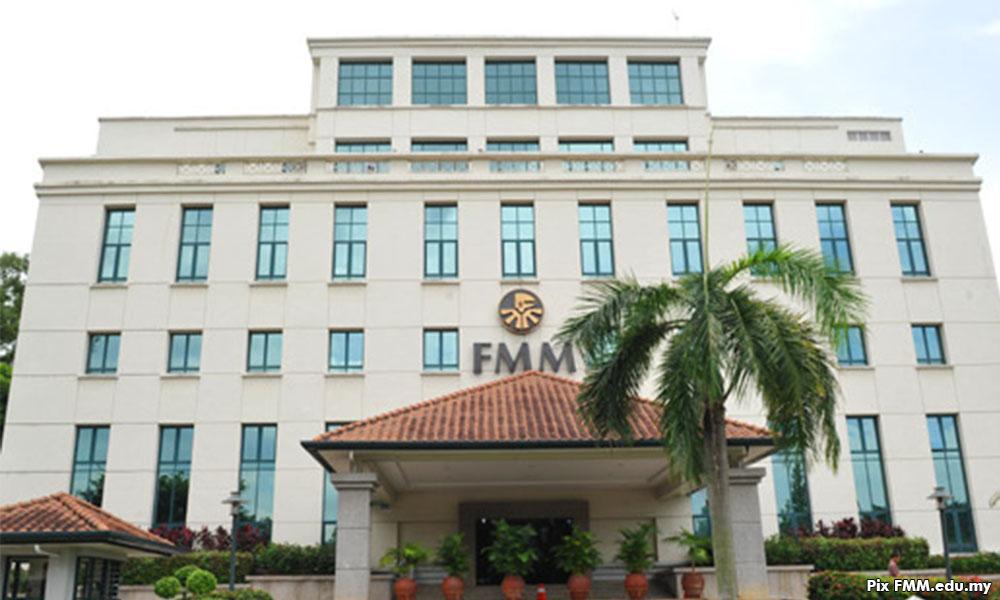
Malay Chambers of Commerce Malaysia (DPMM) president Abdul Halim Husin has praised Prime Minister Muhyiddin Yassin for unveiling a comprehensive short-term economic plan today.
He, however, reminded the government of the importance of ensuring the efficiency of the implementation of the RM35 billion Plan Jana Semula Ekonomi Negara (Penjana).
This is essential to ensure the aid will be able to reach the targeted groups including businesses and employees impacted by economic fallout due to Covid-19 pandemic, he said when contacted.
Citing the special relief facility (SRF), a loan programme announced during the March 27 economic stimulus package, Abdul Halim (above, centre) said some of the applicants were late in receiving the funds.
"The SRF was announced in March and the applications were submitted in April. The loans, which were supposed to be given out by May, were only channelled to the applicants this month," he said.
"Even (if the government) claimed that all money in the SRF was used, that doesn't mean that the money reached the entrepreneurs. They were still in the evaluation process," he said.
"It is as though you go for a 10km run and you are supposed to be given a glass of water mid-way but only get it at the end of the run," he said.
He noted the loans were not in time to save a few businesses from winding up while others are barely sustaining and forced to offer their staff unpaid leave and lay off their employees.
"So the government must speed up not only the process of allocating the loans and grants but also everything (the 40 initiatives) outlined in the economic recovery plan," he said.
Abdul Halim nevertheless commended Muhyiddin for engaging the DPMM, business communities and NGOs over the past two weeks before announcing the economic recovery plan.
In the recent meetings, he said, DPMM had proposed the government extend the implementation of the wage subsidy and enhance the involvement of bumiputera businesspersons in recovery plans.

The government had previously extended the implementation of the wage subsidy to six months from three months. It also planned to empower the involvement of the bumiputera through RM500 million channelled through Perbadanan Usahawan Nasional Berhad (PUNB) and Majlis Amanah Rakyat (Mara).
A few of the initiatives under the Penjana economic recovery plan are slated to take off next month including the tourism tax exemption and tax rebates for new companies.
Meanwhile, in a statement this evening, the Federation of Malaysian Manufacturers (FMM) urged the government to speed up the implementation of 5G infrastructure and high-speed broadband in all parts of the country particularly in industrial estates to support online activities.
"We urge the government to continue with the initiatives to pump prime the economy by expediting infrastructure and development projects," said FMM.
FMM also proposed a tax holiday incentive for new investments to relocate to Malaysia and make this retrospective for such projects from 2019.
"It is also proposed that these incentives be extended to new domestic investments," said FMM.
"We look forward to the Covid-19 Temporary Measures Bill which the government is currently working on to mitigate the potential negative impact to economic activities caused by contractual breaches and enforcement of insolvency actions on groups affected by Covid-19 and the movement control order.
"We urge for work on the bill to be expedited and for a definitive date of gazetting," said FMM.
"We also look forward to being represented in the Special National Committee on Employment to be co-chaired by the ministers of finance and human resources," added FMM.
The government should also place more emphasis on mid-tier companies by introducing more initiatives to support them, noted FMM.

Malaysian SME Association president Michael Kang pointed out that the RM2 billion loan allocated under Penjana to the SMEs was not enough to relieve their economic dilemma.
"I think the economic recovery plan is generally a very good plan. It addresses the need for upskilling employees and uplifting entrepreneurs. The only regret is that the government only allocated RM2 billion in loans for SMEs when we expected RM50 billion.
"How many SMEs can the government help with this amount? Only 4,000 SMEs out of the one million total SMEs in the country," he said.
He reiterated up to 70 percent of the SMEs which has zero revenue during the MCO are in dire need of cash flow to restart their businesses.
An effective economic plan for SMEs should be able to help 20 percent of mid-tier SMEs by allocating adequate loans for them, he said.
"I would say the plan, although it looks beautiful, may not be able to help the SMEs to restart their businesses," he said. "We had brought up this matter with the government which only said it would study it," he said.
Without adequate cash flow, he said the SMEs are unlikely to sign up for the wage subsidy scheme that was designed to save jobs.
In the worst scenario, he said he expected about 30 percent of SMEs to wind up their businesses in three months. - Mkini



No comments:
Post a Comment
Note: Only a member of this blog may post a comment.